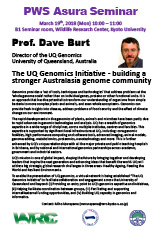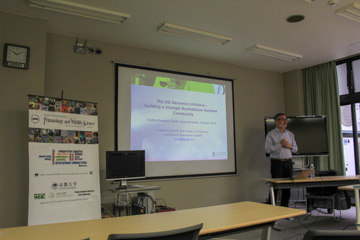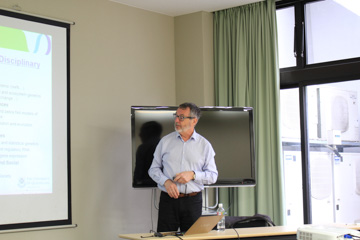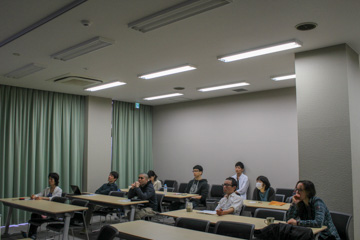The UQ Genomics Initiative - building a stronger Australasia genome community

March 19, 2018. 10:00 - 11:00
Professor Dave Burt
Director of the UQ Genomics, the University of Queensland


Genomics provides a ‘set of tools, techniques and technologies' that address problems at the ‘whole genome scale' rather than on individual genes, proteins or other functional units. It is an approach that has the potential to transform our understanding of organisms from simple bacteria to more complex plants and animals, and even whole ecosystems. Genomics can provide fresh insights into disease, address problems of food security and the effect of climate change on our environment.
The rapid developments in the genomics of plants, animals and microbes have been partly due to rapid advances in genomic technologies and analysis. UQ has a wealth of genomics expertise in a wide range of disciplines, across multiple Institutes, centres and faculties. This expertise is supported by significant local infrastructure at UQ, including: core genomic facilities, high performance computing and software tools, advanced imaging, animal models, genome editing, metabolomics, proteomics, nanotechnology and more. This is further enhanced by UQ's unique relationships with all the major private and public teaching hospitals in Brisbane, and by national and international genomics partnerships across academic, government and industrial sectors.
UQ's mission is one of global impact, shaping the future by bringing together and developing leaders that inspire the next generation and advancing ideas that benefit the world. UQ will address big strategic, global research challenges in three areas: Healthy Ageing, Feeding the World and Resilient Environments.
To enable the presentation of UQ genomics, a virtual network is being established “The UQ Genomics Initiative" to facilitate collaboration and engagement across the University of Queensland and beyond: (i) Providing an entry point to UQ's genomics expertise and initiatives, (ii) Helping facilitate coordination between groups, (iii) Facilitating and supporting internal external funding opportunities, and (iv) Building UQ capacity in genomics and informatics.
Professor David W. Burt (DWB), FRSB, FLS has an extensive background in genome research encompasses more than 35 years of work in the application of molecular genetics in diverse fields. He holds a PhD in Molecular Genetics from Leicester University, received 1st Class Honours in Molecular Biology at The University of Edinburgh and MSc modules in Bioinformatics from Manchester University (2002). DWB's post-doctoral training included research on molecular genetics of a wide range of species (bacteriophage lambda, bacteria, mouse, rat and human) and research areas (transcription circuits, cDNA cloning of growth factors, renin-angiotensin system and hypertension, QTL mapping, bioinformatics, phylogenetics and avian genomics).
DWB has worked with AstraZeneca at Leicester University (UK), Harvard Medical School (USA), MRC Clinical Research Centre (UK) and the Roslin Institute/Edinburgh University (UK). He was appointed Head of the Avian Genomics Group (1988), Director of ARK-Genomics (2000), Director of the National Avian Research Facility (2014), convener of the Institute Strategic Program (Genomics, 2016) and Personal Chair in Comparative Genomics at the University of Edinburgh (2009).
He has obtained over $70m in competitive funding to support his research activities and has published over 284 articles, books and chapters (h-index 58) including in high impact journals such as Nature, Science, Nature Genetics, Current Biology and Genome Research, and has/continues to serve on many national/international committees in the genomics area.
In 2017, DWB was appointed Director of the UQ Genomics Initiative (https://genomics.uq.edu.au/) a virtual network that aims to facilitate partnerships and engagement across all genomics researchers at UQ and beyond. The UQ Genomics Initiative offers a clear point of entry to UQ's collective genomic capabilities, including its interactions with government and industry. As Director, DWB ensures that the UQ Genomics Initiative facilitates interdisciplinary interactions in fundamental and applied research, education, training and consulting across all faculties and institutes.